In today’s fast-paced world, it is crucial to prioritize our overall well-being. This is where holistic health comes into play. Holistic health focuses on the interconnectedness of our mind, body, and spirit to achieve optimal wellness. By taking a comprehensive approach to our health, we can address not only physical ailments but also emotional, mental, and spiritual aspects of our being. It is through this holistic perspective that we can truly thrive and lead fulfilling lives.
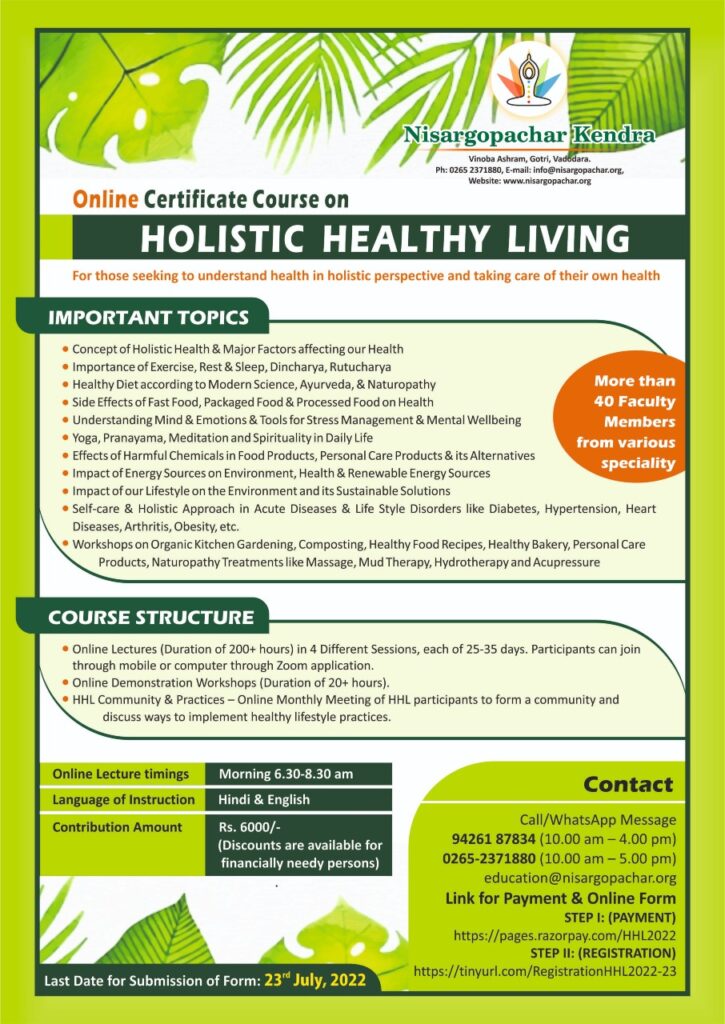
This image is property of nisargopachar.org.
The Physical Aspect of Holistic Health
Exercise
Regular exercise is a crucial component of maintaining holistic health. Engaging in physical activity not only keeps your body fit and strong, but it also has numerous benefits for your mental and emotional well-being. Whether it’s a brisk walk, a yoga session, or a high-intensity workout, exercise helps to improve cardiovascular health, increase muscle strength, and enhance overall mobility. Additionally, it releases endorphins, the feel-good hormones, which can promote a sense of happiness and reduce stress levels. Make sure to incorporate various forms of exercise into your routine to keep it fun and engaging.
Nutrition
A well-balanced and nutritious diet plays a vital role in promoting holistic health. Consuming a wide variety of fruits, vegetables, whole grains, lean proteins, and healthy fats provides your body with the necessary nutrients to function optimally. Proper nutrition supports your physical well-being by strengthening your immune system, enhancing digestion, and supporting healthy weight management. Remember to stay hydrated by drinking an adequate amount of water throughout the day, as it helps to transport nutrients, regulate body temperature, and maintain overall body functions.
Sleep
A good night’s sleep is essential for your overall well-being. During sleep, your body repairs and rejuvenates itself, supporting physical growth and development. Adequate sleep also plays a crucial role in maintaining a healthy weight, boosting immune function, improving memory and cognitive abilities, and enhancing mood and emotional well-being. Make it a priority to establish a consistent sleep routine, creating a peaceful sleep environment and practicing relaxation techniques before bed. Aim for seven to nine hours of quality sleep each night to reap the benefits of a well-rested body and mind.
Hydration
Proper hydration is fundamental for your physical health. Water is involved in nearly every bodily function and is essential for maintaining optimal bodily functions. It helps regulate body temperature, lubricates joints, transports nutrients, and flushes out waste products. Keeping your body properly hydrated supports healthy digestion, aids in weight management, and improves skin health. Make sure to drink an adequate amount of water throughout the day and listen to your body’s signals for thirst. Aim to consume at least eight glasses of water daily and increase this amount if you engage in physical activity or live in a hot climate.
The Mental Aspect of Holistic Health
Stress management
Effective stress management is essential for maintaining mental well-being. Chronic stress can have detrimental effects on your overall health, including increased risk of anxiety, depression, and physical health issues. Find healthy ways to manage stress, such as regular exercise, practicing relaxation techniques, having a support system, and engaging in activities you enjoy. Consider incorporating stress-reducing practices like deep breathing exercises, mindfulness meditation, and keeping a journal to release and manage stress effectively.
Mental relaxation techniques
Engaging in mental relaxation techniques can help you find peace and calm in your daily life. Activities like reading, listening to soothing music, taking baths, or practicing mindfulness can all have a positive impact on your mental well-being. Set aside time each day to indulge in an activity that relaxes your mind and allows you to unwind. By prioritizing mental relaxation, you can reduce stress, improve focus and concentration, and promote overall mental clarity.
Emotional well-being
Nurturing your emotional well-being is key to a healthy and balanced life. Emotions play a significant role in your overall holistic health, and it’s essential to acknowledge and express them in healthy ways. Engage in activities that bring you joy and fulfillment, such as spending time with loved ones, pursuing hobbies, or seeking therapy. Practice self-care and self-compassion, allowing yourself to experience a range of emotions without judgment. Building emotional resilience will have a positive impact on your mental and physical health.
The Spiritual Aspect of Holistic Health
Meditation
Meditation is a powerful tool that can promote spiritual well-being. It involves focusing your mind and redirecting your thoughts to achieve a state of mental clarity and emotional calmness. Regular meditation practice can reduce stress, promote relaxation, improve concentration, and enhance self-awareness. Find a quiet and comfortable space, set aside some time each day, and incorporate meditation into your routine. You can start with guided meditation or explore different techniques such as mindfulness meditation, loving-kindness meditation, or transcendental meditation.
Mindfulness
Mindfulness is the practice of being fully present in the current moment, without judgment or attachment. It involves paying attention to your thoughts, feelings, and sensations in a non-reactive and non-judgmental way. By cultivating mindfulness, you can increase self-awareness, reduce stress, improve focus and concentration, and enhance overall well-being. Incorporate mindfulness into your daily life by engaging in activities mindfully, such as eating, walking, or interacting with others. Practice mindful breathing techniques to anchor yourself in the present moment throughout the day.
Connection with nature
Connecting with nature can have a profound impact on your spiritual well-being. Spending time outdoors, whether it’s hiking in the mountains, walking on the beach, or simply sitting in a park, allows you to reconnect with the natural world and find peace and serenity. Nature provides an opportunity to slow down, reflect, and appreciate the beauty around you. Whether it’s observing a vibrant sunset, listening to the sounds of birds chirping, or feeling the earth beneath your feet, these experiences can deepen your spiritual connection and bring a sense of calm and joy to your life.
Practicing gratitude
Practicing gratitude is a powerful spiritual practice that cultivates positivity and shifts your focus towards appreciation for the present moment. Take a moment each day to reflect on the things you are grateful for, whether it’s the support of loved ones, the beauty of nature, or the simple pleasures in life. Expressing gratitude can improve your mood, enhance relationships, and increase overall life satisfaction. Consider keeping a gratitude journal or sharing your gratitude with others. By acknowledging the blessings in your life, you invite more positivity and abundance into your spiritual well-being.
The Social Aspect of Holistic Health
Building healthy relationships
Building and nurturing healthy relationships is vital for your social well-being. Surrounding yourself with positive and supportive individuals who uplift and inspire you can have a profound impact on your mental and emotional well-being. Engage in open and honest communication, practice active listening, and show empathy and understanding towards others. Cultivate meaningful connections by participating in social activities, reaching out to others, and investing time and effort in building and maintaining relationships.
Support systems
Having a strong support system can provide you with emotional stability and a sense of belonging. Surround yourself with friends, family, or support groups who offer love, encouragement, and understanding during both positive and challenging times. Lean on your support system for guidance, advice, and a listening ear when needed. Building a reliable network of individuals who genuinely care about your well-being can contribute to your overall social and emotional wellness.
Community involvement
Getting involved in your community can have a positive impact on your overall well-being. Volunteer your time and skills to local organizations, participate in community events, or join groups with a shared interest. Engaging in community involvement promotes a sense of purpose and belonging, allows you to connect with like-minded individuals, and gives you an opportunity to make a positive difference in the lives of others. Contributing to your community fosters social connection, empathy, and a sense of fulfillment.
Empathy and compassion
Cultivating empathy and compassion towards others is a key aspect of social well-being. Empathy allows you to understand and share the feelings of others, while compassion drives you to take action to alleviate their suffering. Practice active empathy by actively listening, showing kindness, and seeking to understand others’ perspectives. Engaging in acts of compassion, such as volunteering or random acts of kindness, not only benefits others but also strengthens your own sense of empathy and social connectedness.
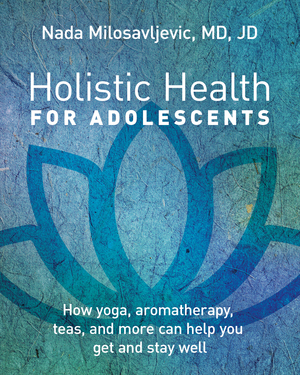
This image is property of cdn2.wwnorton.com.
The Environmental Aspect of Holistic Health
Sustainable living
Embracing sustainable living practices not only benefits the environment but also contributes to your own well-being. Reduce, reuse, and recycle to minimize waste and conserve resources. Opt for eco-friendly alternatives in your daily life, such as using reusable bags, choosing energy-efficient appliances, and reducing water consumption. Embracing sustainable living practices connects you with the natural environment, fosters a sense of responsibility, and promotes overall environmental well-being.
Reducing exposure to toxins
Reducing exposure to toxins and harmful substances is essential for your environmental and physical health. Minimize the use of products containing harmful chemicals, such as certain cleaning agents, personal care products, and pesticides. Choose natural and organic alternatives whenever possible to reduce your exposure to potentially harmful substances. By reducing your exposure to toxins, you protect your immediate environment and promote overall well-being.
Creating a healthy physical environment
Creating a healthy physical environment in your home and workspace is essential for your overall well-being. Ensure proper ventilation, maintain cleanliness, and eliminate clutter to promote a sense of calm and orderliness. Surround yourself with items that bring you joy and inspire productivity. Incorporate nature into your environment by including plants or natural elements that can improve air quality and create a visually pleasing and soothing atmosphere. A healthy physical environment enhances your overall well-being, productivity, and mental clarity.
The Intellectual Aspect of Holistic Health
Continual learning
Engaging in continual learning and intellectual growth is essential for your overall holistic health. Embrace curiosity and seek opportunities to expand your knowledge and skills. Read books, attend seminars, take online courses, or participate in workshops that align with your interests and passions. Intellectual growth is not limited to academic pursuits; it can also include learning new hobbies, exploring different cultures, or developing skills in various areas. By continuously challenging yourself intellectually, you foster personal growth, improve cognitive abilities, and enhance your overall well-being.
Intellectual stimulation
Stimulating your mind with intellectually challenging activities is crucial for maintaining holistic health. Solve puzzles, engage in thought-provoking discussions, or participate in activities that require problem-solving and critical thinking skills. Intellectual stimulation keeps your mind sharp, enhances memory, and promotes overall mental well-being. Incorporate activities into your routine that challenge your mind and expand your knowledge, such as reading thought-provoking literature, engaging in strategic games, or engaging in stimulating conversations with others.
Creative expression
Engaging in creative expression allows you to tap into your imagination and express yourself freely. Explore various forms of creative outlets such as painting, writing, dancing, or playing a musical instrument. Creative expression promotes self-discovery, reduces stress, and enhances emotional well-being. Embrace your creativity and incorporate it into your daily life, allowing yourself to express thoughts, emotions, and ideas in a unique and meaningful way. By embracing creative expression, you tap into your inner self and enhance your overall intellectual and emotional well-being.
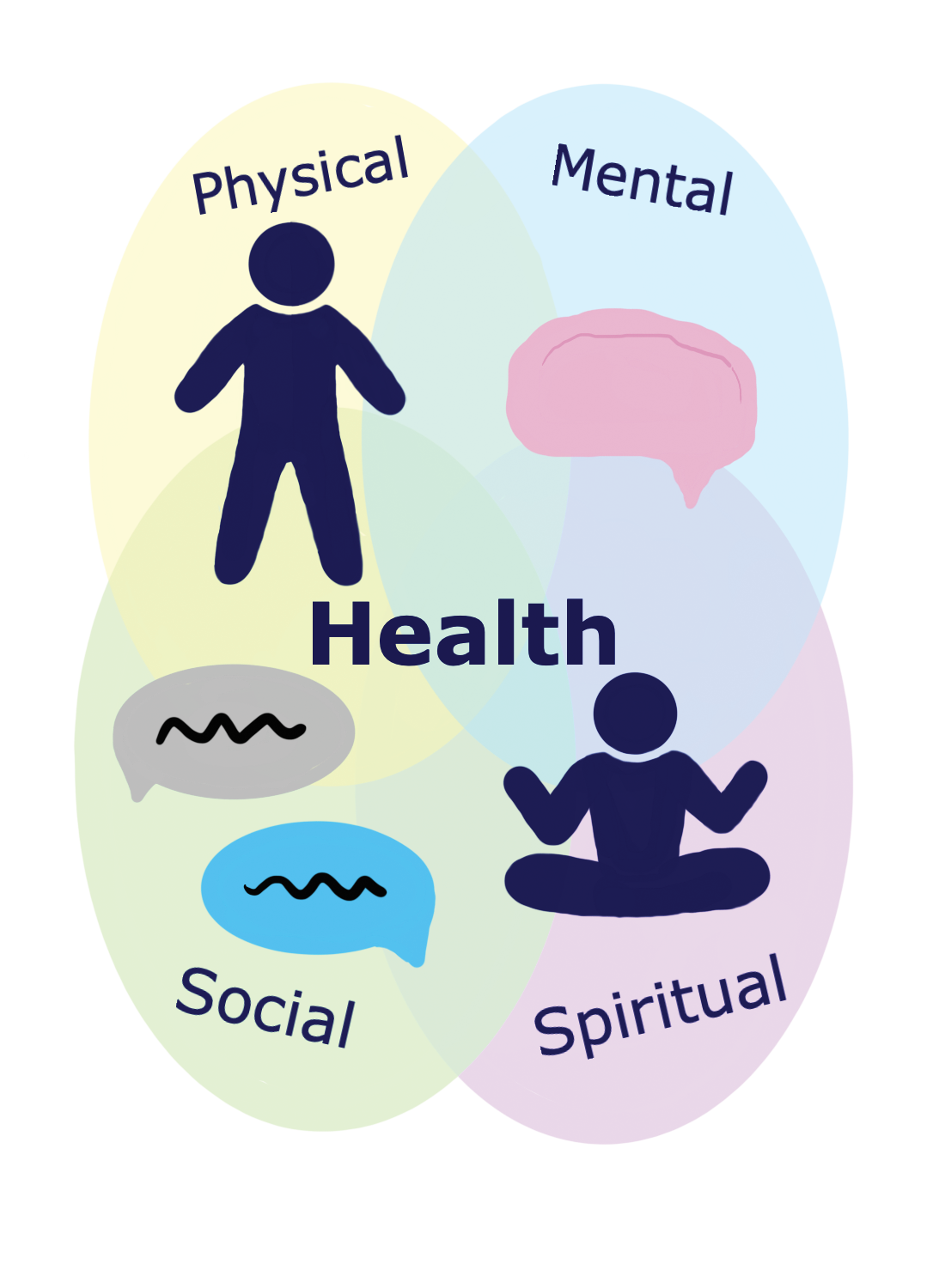
This image is property of www.theonlineclarion.com.
The Occupational Aspect of Holistic Health
Work-life balance
Achieving a healthy work-life balance is essential for your occupational well-being. Strive to maintain a balance between your personal and professional life, ensuring that both areas receive adequate attention and focus. Set boundaries, establish a structured work schedule, and prioritize self-care and leisure activities. By achieving a healthy work-life balance, you reduce stress, prevent burnout, and promote overall occupational satisfaction and well-being.
Job satisfaction
Finding satisfaction and fulfillment in your chosen profession is vital for your occupational well-being. Engage in work that aligns with your passions, values, and interests. Seek meaningful projects, opportunities for growth, and a supportive work environment. Cultivate healthy relationships with colleagues and superiors and be open to constructive feedback and continuous professional development. When your work brings you joy and a sense of purpose, it positively impacts your overall well-being and promotes a healthy work-life balance.
Professional growth and development
Continuously investing in your professional growth and development is essential for long-term occupational well-being. Stay updated with industry trends, attend workshops or conferences, and seek opportunities for advancement or skill enhancement. Establish clear career goals, create a plan for professional development, and take proactive steps towards achieving them. By pursuing professional growth, you not only expand your knowledge and skills but also increase your overall job satisfaction and career prospects.
The Financial Aspect of Holistic Health
Financial stability
Financial stability is an important aspect of holistic health that can significantly impact your overall well-being. Establishing a solid financial foundation involves budgeting, managing debt, saving, and investing wisely. Assess your financial situation and create a realistic budget that aligns with your income and expenses. Prioritize saving for emergencies and future goals, and avoid unnecessary debt. Focus on long-term financial security by making sound financial decisions and seeking professional advice when needed. Achieving financial stability provides a sense of security, reduces stress, and enhances your overall holistic health.
Budgeting and financial planning
Creating and following a budget is a key component of financial well-being. Track your income and expenses, review your spending habits, and make necessary adjustments to align with your financial goals. Determine your essentials, allocate funds for savings and investments, and set aside money for discretionary expenses. Regularly review your budget and make adjustments as necessary. By practicing effective budgeting and financial planning, you gain control over your finances, reduce financial stress, and pave the way for long-term financial well-being.
Reducing financial stress
Financial stress can have a significant impact on your overall well-being. Implement strategies to reduce financial stress by practicing mindful spending, living within your means, and seeking professional advice when needed. Create an emergency fund to provide a safety net during unexpected situations. Focus on long-term financial goals and create a plan to achieve them. Prioritize your financial health, and take proactive steps to reduce debt and increase savings. By addressing and managing financial stress, you can improve your overall well-being and enjoy a sense of financial security.
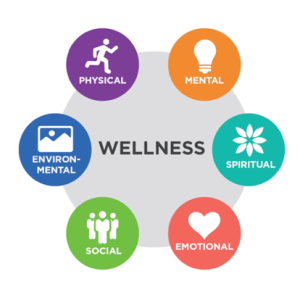
This image is property of globalwellnessinstitute.org.
The Cultural Aspect of Holistic Health
Cultural awareness and appreciation
Embracing cultural awareness and appreciation is important for fostering social connections, building empathy, and celebrating diversity. Educate yourself about different cultures, traditions, and customs, and recognize the value they bring to our society. Engage in cultural events, visit museums or participate in cultural exchanges. Practice open-mindedness and respect towards individuals from different cultural backgrounds, and seek opportunities to learn from one another. Cultivating cultural awareness and appreciation enriches your own life and strengthens social bonds within the community.
Inclusion and diversity
Promoting inclusion and embracing diversity is essential for collective well-being and a harmonious society. Challenge biases and prejudices you may hold and seek to understand and empathize with experiences different from your own. Encourage inclusivity in your social circles, workplaces, and communities. Embrace diversity in all its forms and actively support equal opportunities for all individuals. By fostering an inclusive environment, you contribute to the holistic health of both yourself and the broader community.
Respecting and celebrating differences
Respecting and celebrating differences is a cornerstone of cultural well-being. Embrace the unique qualities and perspectives that individuals from different cultures bring to our society. Emphasize unity, understanding, and cooperation while valuing the rich heritage and traditions that characterize diverse cultures. Engage in intercultural dialogue, celebrate multicultural events, and seek opportunities to learn from different cultural practices. By appreciating and respecting differences, you contribute to a more harmonious and culturally vibrant world.
The Recreational Aspect of Holistic Health
Hobbies and interests
Engaging in hobbies and pursuing personal interests is essential for your recreational well-being. Explore activities that bring you joy, whether it’s gardening, painting, playing an instrument, or cooking. Hobbies provide an outlet for creativity, promote relaxation, and enhance overall well-being. Dedicate time each week to indulge in your hobbies and allow yourself to fully immerse in the experience. By prioritizing recreational activities, you foster a sense of fulfillment, reduce stress, and promote a balanced and holistic lifestyle.
Leisure activities
Engaging in leisure activities allows you to recharge and rejuvenate your mind and body. Whether it’s going for a walk in nature, enjoying a movie night, or spending quality time with loved ones, leisure activities provide an opportunity to relax and unwind. Make time for leisure activities in your daily or weekly routine and prioritize self-care. Engaging in leisure activities enhances your overall well-being, cultivates happiness, and allows you to find enjoyment and fulfillment outside of work or responsibilities.
Relaxation and rejuvenation
Finding time for relaxation and rejuvenation is crucial for maintaining a healthy and balanced lifestyle. Engage in activities that promote relaxation, such as practicing yoga, taking warm baths, getting massages, or meditating. Disconnect from technology and create quiet and peaceful moments to rest and recharge. Prioritize self-care and make it a habit to dedicate time each day to relax and rejuvenate. By incorporating relaxation into your routine, you foster overall well-being, reduce stress levels, and promote a harmonious and balanced lifestyle.
Incorporating holistic health practices into your daily life can have a profound impact on your overall well-being. By addressing the physical, mental, spiritual, social, environmental, intellectual, occupational, financial, cultural, and recreational aspects of holistic health, you create a harmonious and balanced approach to living. Embrace the various dimensions of holistic health, make conscious choices that support your well-being, and prioritize self-care. Remember, holistic health is a journey, and by continuously nurturing and integrating these practices into your life, you can experience a higher quality of life and flourish in all aspects of your being.
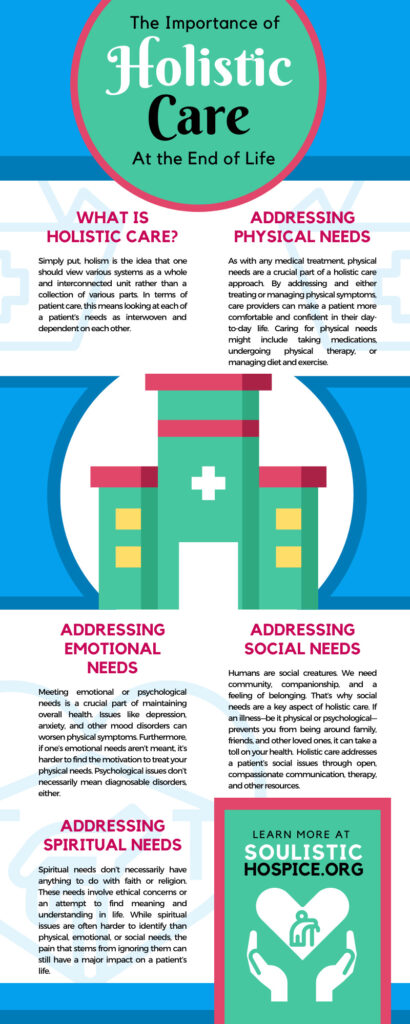
This image is property of lp-seotool.s3.us-west-2.amazonaws.com.

